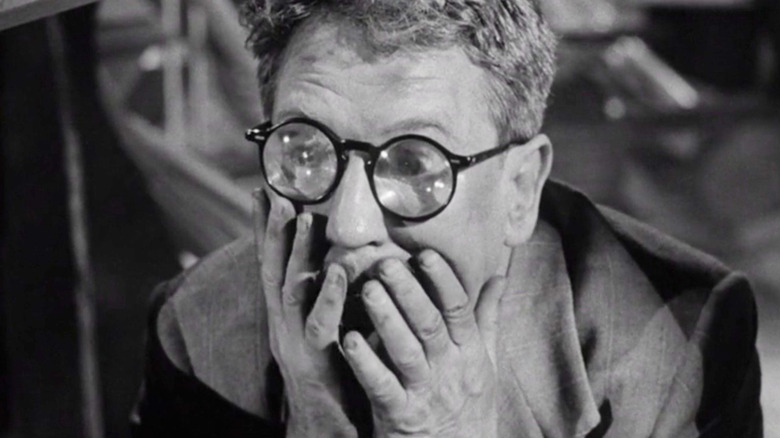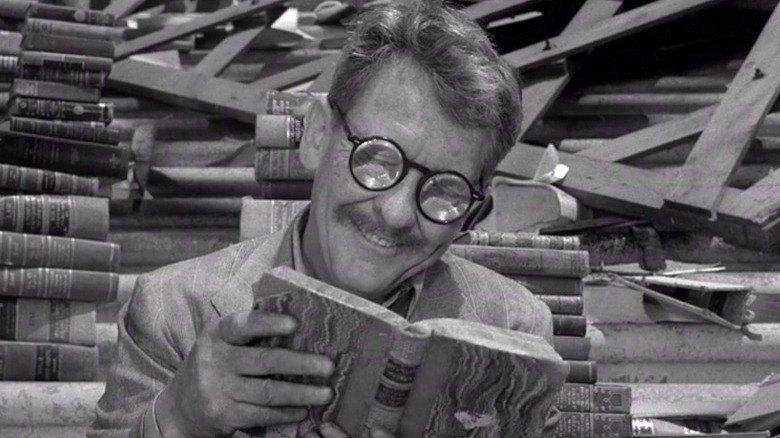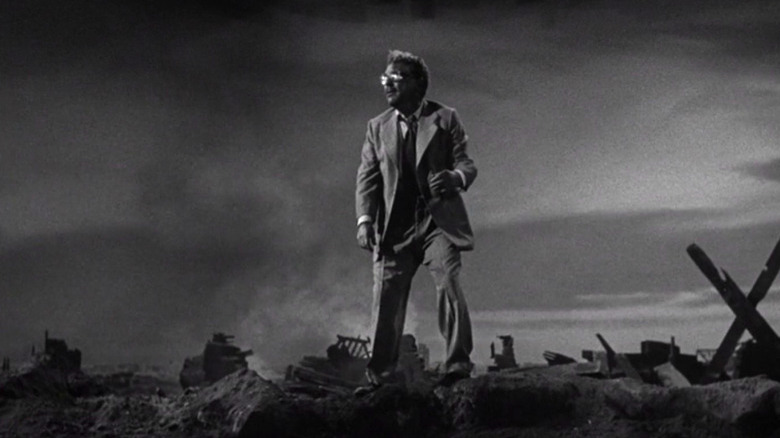Rod Serling's Favorite Twilight Zone Episode Had One Of The Saddest Endings In TV History
"The Twilight Zone" may have been an anthology series that featured a new cast of actors every single week, but it had a star. Series creator Rod Serling, an Emmy Award-winning screenwriter who personally wrote 92 episodes of the 156-episode series, was also the show's headliner. Every episode began with Serling introducing the story, teasing the unexpected ironies that would befall the latest characters. His pleasingly gravelly voice and serious business suit gave him an on-air authority usually reserved for news anchors, which gave a powerful legitimacy to the strange tales that were about to unfold.
Rod Serling was indelibly linked to "The Twilight Zone" in front of and behind the camera and was a driving force behind its bizarre tales of sci-fi and supernatural. So it might stand to reason that Serling, as a producer and a frontman for the series, wouldn't play favorites with the many episodes of the show. He could very easily have shrugged and said he loved them all, whenever someone asked what his favorite was. But Serling was also a straight-shooter, and he had his favorites. Both were wonderfully ironic sci-fi stories, and the one he adapted for the screen himself features what may very well be the most depressing ending in the history of television.
'Time Enough at Last'
The eighth episode of "The Twilight Zone" is such an indelible classic that it almost looks like the series peaked early. But while "Time Enough at Last" is a certified all-timer, it set the stage for more great episodes to come.
Burgess Meredith, the Oscar-nominated star of "Rocky" and "Of Mice and Men," stars as Henry Bemis. He's a mild-mannered bank teller whose boss can barely stand him. Sadly, his wife hates him even more. Henry Bemis is not a bad person. If anything, he's mild-mannered to a terrible fault. All he wants to do is read his books. It's all that brings him joy. And everyone around him hates him for it.
Serling's adaptation of Lynn Venable's short story places a lot of emphasis on Bemis's plight. It's impossible, looking at Meredith through his thick glasses and listening to his stumbling voice as he struggles to get a word in edgewise, not to feel pity for him. He may be a dreamer, but everyone around him is a nightmare, and they judge him too harshly. They threaten to fire him. They vandalize his books. So all we want is for Henry Bemis to be able to read. He deserves it.
So, when the apocalypse suddenly comes and all other life on Earth is destroyed, it seems like this might actually be the best thing that ever happened to the guy. The sole survivor of a nuclear apocalypse, saved by sheer luck because he took his break in the bank vault, he's all alone now. Nobody to bother him. And since the library is mostly intact, he finally has all the time in the world to read his books, unbothered by bullies.
And then ... his prescription reading glasses break, which means all those books will go unread, by anyone, forever. Bemis cries, the story ends, and TV history was made.
Sheer, pure, beautiful irony
A lot of "Twilight Zone" episodes end in ironic tragedy, but the victims frequently did something to deserve it. The astronaut in "I Shot An Arrow Into the Sky" endures a shocking revelation only after he betrays his fellow castaways. The ill-fated protagonist of "Four O'Clock," a conspiracy theorist plotting against "evil" people, meets a terrible fate because he doesn't realize he is the only evil person he knows.
In contrast, Henry Bemis did nothing to deserve the saddest fate in the history of televised fiction. He was treated cruelly by everyone in his life, and when those people went away, he was treated cruelly by luck. Or at least, by whichever forces rule The Twilight Zone.
In a 1970 interview with James Gunn (the Hugo Award-winning writer of sci-fi stories like "The Immortals," no relation to the "Guardians of the Galaxy" filmmaker), Serling said "Time Enough at Last" was one of his two favorite episodes. He described the twist as "sheer, pure, beautiful irony." He was also proud of how the production turned out on a TV budget, recalling that "we used an MGM backlot with existing sets that were already there, and it looked like a movie."
The same couldn't be said for Serling's other favorite episode, "The Invaders," starring Agnes Moorehead as a woman besieged by tiny aliens in her house. There was just no way to get the special effects to look convincing on TV in the 1960s, Serling lamented. "So all we could use, because we couldn't afford opticals, because we couldn't afford montage effects, were little wind-up rubber men, and they walked precisely like little wind-up rubber men. And I thought it totally ruined the illusion, and it pointed out to me the desperate, built-in problems of doing proper science fiction on television."
But this one time, at least, it worked. Unfortunately for Mr. Bemis.


